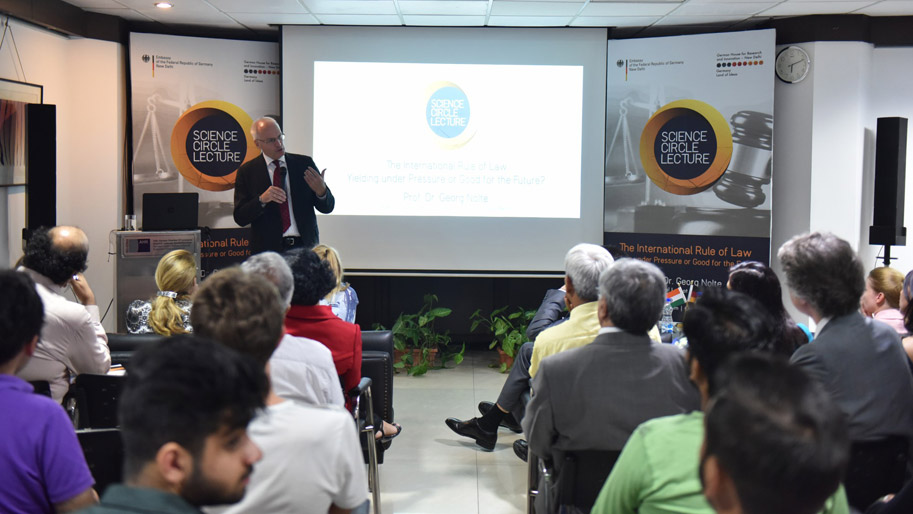Science Circle Lecture "The International Rule of Law - Yielding under Pressure or Good for the Future?"
 © DWIH New Delhi
© DWIH New Delhi
Under the aegis of the German Embassy, New Delhi, the German House for Research and Innovation (DWIH) organized yet another Science Circle Lecture (SCL) titled “The International Rule of Law – Yielding under Pressure or Good for the Future?” on Tuesday, 29th August 2017. Hosted at the German House, the lecture not only attracted lawyers but also had extensive participation from other embassies, law institutes, universities and societies, ministries and corporates. Being third in the SCL series for this year, the event commenced with a welcome speech by German Ambassador – Dr Martin Ney who not only introduced Prof Dr George Nolte, the speaker for the evening but also laid special emphasis on the importance and impact of rules based international law.
A member of United Nation’s International Law Commission and associate member of the Institut de Droit International, Prof Nolte addressed the audience by citing similarities between India and Germany’s present laws – that according to him are most often a manifestation of the past. Drawing from his extensive research and knowledge, he traced the history of international rules based order and divided it into three phases viz. 1990 – constitutionalization of international law, 2000 – era of ambiguity and 2007 onwards as the era of rethinking of international law.
Subscribing to various examples such as those of the Humanitarian law and investment treaties amongst many others, Prof Nolte highlighted the importance of interpreting old rules in this new age especially when the rules are losing their clarity with each passing day. Moreover, he also stressed on the declining sense of inevitability for the International Criminal Court and stated three major reasons for such instabilities namely transnational terrorism and nuclear proliferation, challenge to free market globalization and geo-politics. However, in the end, Prof Nolte concluded and clarified that the contestation of the 1990s model of international rule based law does not essentially refer to its non-existence in the future but rather calls for giving more importance to the state so as to balance out the quasi-automatic theory that applies without any adaptation.
The lecture was soon followed by an extensive Q&A session wherein many from the well-informed audience asked intriguing questions that were answered by Prof Nolte and the discussions finally ended into a brief networking high-tea.
Date: Tuesday, August 29, 2017
Venue: German House
